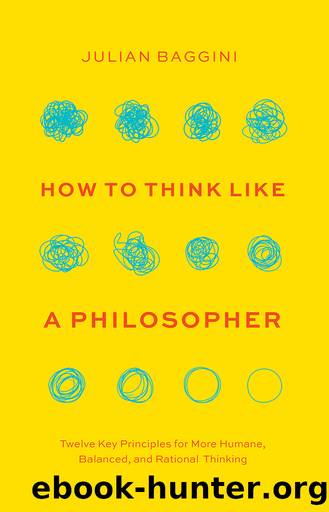How to Think Like a Philosopher by Julian Baggini;

Author:Julian Baggini;
Language: eng
Format: epub
Publisher: University of Chicago Press
Published: 2023-05-15T00:00:00+00:00
8
KNOW WHAT MATTERS
He is a man of intelligence, but to act sensibly, intelligence is not enough.
FYODOR DOSTOEVSKY, Crime and Punishment
Philosophy frequently flirts with pointlessness, and every now and again the flirtation turns into a deep affair. Such moments can suffocate the will to live. I remember one such low when sitting through a lecture based around a paper entitled âHousecleaning and the Time of a Killingâ. Its first dry-as-dust sentence reads: âJudith Jarvis Thomson has pointed out that there is a difficulty in specifying the time a killing takes place.â Hereâs the so-called problem.
Say Bugsy shoots Babyface. Babyface is rushed to hospital, the cops chase Bugsy and shoot him dead. A few hours later, Babyface dies. So when did Bugsy kill Babyface? Not when he shot him, because Babyface hadnât yet died. But not when Babyface died, as Bugsy was already dead, and how could a dead man kill someone? So it looks like there is no time when the killing took place. But there was a killing. How could such an event have taken place at no time?1
If youâre intrigued by when Bugsy killed Babyface, it could be because you enjoy logic puzzles, which is fine. For me, however, the problem is obviously generated by language. There is no fundamental puzzle about what has happened and when. You can describe the timeline of events completely. A problem only arises if you insist that somewhere on this timeline we have to locate something called âthe killingâ. If you do that, itâs then a matter of who can suggest the most plausible way of doing so. Jarvis Thomson, for instance, proposes that actions can have among their parts events that are not actions. So the killing is an event that extends over time from the shooting to the dying.
But there is only a problem to be solved if we make the baseless assumption that every time we use an event noun such as âa killingâ it must refer to an event at a determinate time. Not everything we refer to with an event noun has precise time boundaries. The Enlightenment did not begin at a precise time on the day in 1651 when Thomas Hobbes published his Leviathan, in part because there is no specific second when a book can be said to have been published. âPublicationâ is not a discrete event but a process with an indeterminate beginning and end. There is no need to agonise over when exactly Bugsy killed Babyface when we know everything that happened and when. This looks like a classic category mistake: language has tricked us into thinking a killing is an event at a determinate time when in this case the word is being used as shorthand to describe something that unfolded over time.
I could be wrong about this. Maybe there is a good reason why we need to be able to be more precise about when actions such as killings take place, and itâs not obvious to a metaphysical bumbler like me. But
Download
This site does not store any files on its server. We only index and link to content provided by other sites. Please contact the content providers to delete copyright contents if any and email us, we'll remove relevant links or contents immediately.
| Anthropology | Archaeology |
| Philosophy | Politics & Government |
| Social Sciences | Sociology |
| Women's Studies |
The remains of the day by Kazuo Ishiguro(7544)
Tools of Titans by Timothy Ferriss(6938)
The Black Swan by Nassim Nicholas Taleb(6185)
Inner Engineering: A Yogi's Guide to Joy by Sadhguru(5888)
Giovanni's Room by James Baldwin(5873)
The Way of Zen by Alan W. Watts(5790)
The Six Wives Of Henry VIII (WOMEN IN HISTORY) by Fraser Antonia(4786)
The Power of Now: A Guide to Spiritual Enlightenment by Eckhart Tolle(4749)
Astrophysics for People in a Hurry by Neil DeGrasse Tyson(4614)
Asking the Right Questions: A Guide to Critical Thinking by M. Neil Browne & Stuart M. Keeley(4567)
12 Rules for Life by Jordan B. Peterson(3726)
The Ethical Slut by Janet W. Hardy(3494)
Skin in the Game by Nassim Nicholas Taleb(3456)
Housekeeping by Marilynne Robinson(3397)
The Art of Happiness by The Dalai Lama(3378)
Double Down (Diary of a Wimpy Kid Book 11) by Jeff Kinney(3267)
Skin in the Game: Hidden Asymmetries in Daily Life by Nassim Nicholas Taleb(3259)
Walking by Henry David Thoreau(3228)
12 Rules for Life: An Antidote to Chaos by Jordan B. Peterson(3197)
